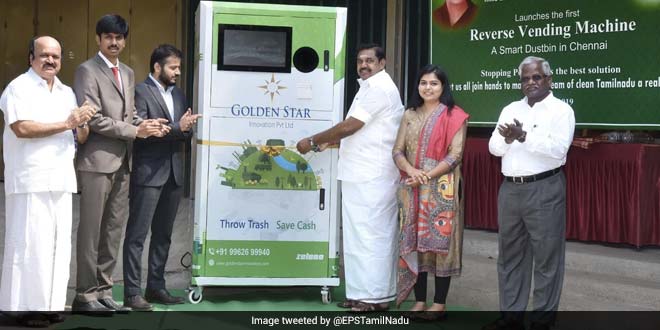Mumbai: Have you ever wondered what happens to the plastic bottle that you purchase and dump it after one-time use? It either goes to the landfill or makes it way to the water bodies. Every minute one million plastic bottles are consumed worldwide adversely affecting the environment and marine life. But what if you could give a second life to the bottle and get a reward in return. Executing this concept in Chennai, Tamil Nadu, Chief Minister Edappadi K Palaniswami recently launched state’s first reverse plastic vending machine.
“To prevent environmental hazards and increase awareness among people to manage and recycle plastic waste, a reverse vending machine or smart dustbin has been launched in the state for the first time,” the Chief Minister said during the launch at his Greenways Road residence.
இன்று(31.01.2019), முகாம் அலுவலகத்தில், சென்னையில் முதல்முறையாக Smart Dustbin (Reverse Vending Machine) பயன்பாட்டினை துவக்கி வைத்தேன். pic.twitter.com/L1oHHw5UZE
— Edappadi K Palaniswami (@EPSTamilNadu) January 31, 2019
The machine has been provided by the Golden Star Innovations Private Limited in association with Zeleno, the company that has installed a total of seven machines in Delhi last year. It costs around Rs 5 lakh. The vending machine can crush plastic bottles and aluminum cans into pieces that can be recycled. It can store up to 2,500 bottles at a time and once it reaches 85 per cent limit, the crushed pieces of plastic will be handed over to the recycling units in the city.
Explaining the use and features of the machine, Hephzibah Nevis, Director of Golden Star Innovations Private Limited tells NDTV,
Anyone can deposit a plastic bottle or an aluminum can in the machine. On dropping the bottle, reward options will be displayed on the screen. The user can choose one option and collect the coupon to redeem it later. The coupons will contain discounts on various products and restaurants.
The goal behind the machine is to provide a platform to engage people in disposing plastic in a scientific manner. It is important for people to use it as once plastic bottle gets contaminated it can never be recycled, she adds further.
Apart from being environment-friendly, the installation of machine will also be beneficial to disable-friendly people and women from the underprivileged background as Golden Star company will employ people to operate the machine.
We wanted to ensure that various stakeholders get a chance to contribute through the vending machines. Government will help us in identifying locations and giving permissions to install the machines. Citizens will help reduce plastic bottle waste in the state and employment opportunities will be created for the underprivileged, adds Ms Nevis.
500 more such machines will be installed across the state by the end of this year. The Chief Minister has asked the company to place the vending machines in crowded places like bus and railway stations to yield the best results.
NDTV – Dettol Banega Swachh India campaign lends support to the Government of India’s Swachh Bharat Mission (SBM). Helmed by Campaign Ambassador Amitabh Bachchan, the campaign aims to spread awareness about hygiene and sanitation, the importance of building toilets and making India open defecation free (ODF) by October 2019, a target set by Prime Minister Narendra Modi, when he launched Swachh Bharat Abhiyan in 2014. Over the years, the campaign has widened its scope to cover issues like air pollution, waste management, plastic ban, manual scavenging and menstrual hygiene. The campaign has also focused extensively on marine pollution, clean Ganga Project and rejuvenation of Yamuna, two of India’s major river bodies.






























